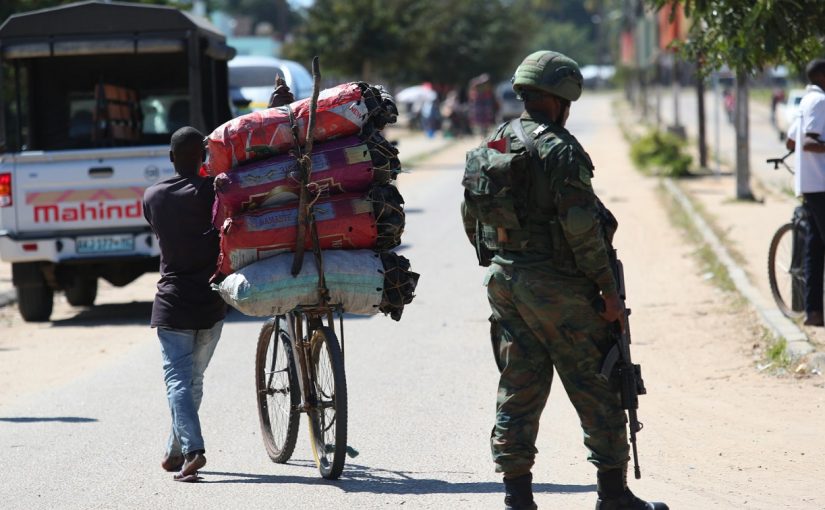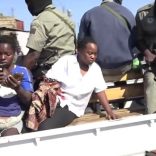Mozambique: District Permanent Secretary questioned for embezzlement - AIM | Watch
Mozambique: Assessment mission proposes SADC forces withdraw by July 2024 – Lusa

FILE - For illustration purposes only. [File photo: Lusa]
An assessment mission has proposed the complete withdrawal of the southern African military fighting armed groups in Cabo Delgado by July 2024, noting that the situation in the province “is now calm”, although risks prevail.
The assessment, consulted today by Lusa, was proposed on Tuesday to the Extraordinary Summit of the SADC (Southern African Development Community) Troika on Cooperation in the Areas of Politics, Defence and Security, held on Tuesday.
The communiqué released on Tuesday by the Mozambican authorities at the end of the summit does not address the aforementioned proposal to withdraw the Southern African Military Mission (SAMIM) but reports on an extension of the term of the regional troop presence in Cabo Delgado province, northern Mozambique, for another year, that is, until 16 July 2024.
In the recommendations, the assessment mission advises the gradual start of SAMIM’s exit from 15 December this year and the completion of the withdrawal on 15 July 2024, that is, one day before the end of the extension period decided on Tuesday by the SADC troika.
The analysis of the situation points out risks arising from the permanence of SAMIM for another year such as the “growing financial stress of member states and lack of budget for actions to mobilise communities to support foreign troops”.
It also warns of the danger of deteriorating relations between the SADC military and communities affected by “terrorism” in Cabo Delgado and of a less well-planned withdrawal.
The assessment mission presented to the SADC Organ Troika Extraordinary Summit another scenario of a longer stay of the Southern African military, with a timetable starting with a phased withdrawal on 15 December 2024 and ending on 15 July 2025.
Another option, which has since been discarded due to the extension of SAMIM’s mandate for another year, would be to extend the presence of SADC forces for only six months, but this scenario would entail risks of a rapid deterioration of the security situation and the spread of armed groups’ actions to more territories.
For all three scenarios of withdrawal of regional forces, the assessment mission pointed to the imperative for the Armed Forces of Defence and Mozambique (FADMO) to be empowered to replace foreign military personnel in areas reclaimed from the rebels in Cabo Delgado.
In this regard, the mission notes the capacity-building efforts of the Mozambican army undertaken by the European Union (EU) and the United States of America (USA).
SADC notes that progress has been made in the fight against the insurgents, who have been cornered in a reduced perimeter in Macomia district.
Faced with the defeats they suffered, the document continues, the insurgents adopted a new tactic, splitting into small groups, which mingle with the population and buy products at inflated prices, in an effort to “win hearts and minds”.
In this attempt to socialise with the population, they try to convey the message that they only want to install an Islamic state and are against violence, the SADC assessment mission said.
Despite the advances, joint combat actions against terrorists must continue, adapting to the new mode of action of the rebels by intensifying the mechanisms for gathering operational information, the text reads.
In addition to SAMIM and the Mozambican government forces, Rwandan troops are fighting the insurgency in Cabo Delgado, operating on the perimeter of the area where the natural gas projects in the Rovuma basin are located.
Cabo Delgado province has faced an armed insurgency for almost six years, with some attacks claimed by the extremist group Islamic State.
The insurgency has led to a military response since July 2021, with support from Rwanda and SADC, liberating districts near the gas projects, but new waves of attacks have emerged to the south of the region and in neighbouring Nampula province.
The conflict has displaced one million people, according to the United Nations High Commissioner for Refugees (UNHCR), and claimed around 4,000 lives, according to the ACLED conflict registration project.













Leave a Reply
Be the First to Comment!
You must be logged in to post a comment.
You must be logged in to post a comment.